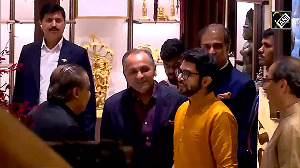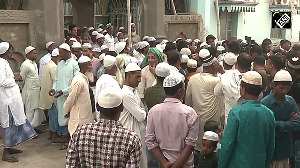
Part I: The road to Pakistan
Part II: Visiting a hostile country
Part III: Assalamu Alikum
As we got down from the bus, we were surrounded; greetings flew at us from every direction, making us feel very much at home. The girls were wearing tracks and trendy pyjamas; some even wore sleeveless outfits. As for the boys, there was not a single billowing Pathan salwar in sight! One guy, who smiled almost all the time, introduced himself as Hamza. I could see he too was sorting out some preconceptions in his mind. He took my bag and told me we would be sharing a room.
Too tired to change my clothes or brush my teeth, I dumped my stuff in a corner and dropped into bed. The journey, with its excitement and tension, had worn me out. I must have dozed off because the next thing I remember is my new Pakistani friends waking me up so I could join in the fun and interaction going on in the hall below.
There was general horsing around and suggestions of Antachiri, the Pakistani version of our very own Antakshari. Eventually the game Kho was decided on and we made our way to the lawn. The large lake beside it was home to a gaggle of ducks. One of the Pakistani participants, Currim, loved the ducks and would keep trying to get as near to them as possible. Another, Mustapha Raja, was eager to discuss the Kashmir issue and the highs and lows in the Indo-Pak relationship. These discussions were friendly and filled with curiosity. We could have been a bunch of students anywhere.
It was all so surreal. Was this the same Karachi that our Navy would attempt to blockade if war broke out between our two countries? Was this the hostile country I was worried about?
We began playing Kho, but it was not Pakistan against India. We were just two teams, Ducks and Quacks, trying to best the other and having fun while at it.
The next day, I got to know the Pakistani participants better. They had the same fears and concerns as young people anywhere. They too wanted lasting peace in the region. The commonalities were an eye-opener.
The workshop began after the group from Mumbai arrived. We were to make a 15 minute film focusing on the cultural richness of the two countries while weaving in the beliefs that were creating deep, uncompromising fissures between its people. It would be a unique experience because, for the first time, youngsters from India and Pakistan were getting together to make a film. Internationally renowned individuals, who had volunteered their time and expertise, would guide us.
The first task belonged to the script-writing team, comprising of five Pakistanis and two Indians (including me). We had two days to come up with a script. So off we went into the library with well-known writer Shandana Minhas, who had volunteered to guide us. Besides working with theatre groups and writing scripts for theatrical productions and television, Shandana is a regular contributor to The Friday Times and the web-based portal, Chowk.
Before we could even figure out a connecting thread in the maelstrom created by our brainstorming session, Shandana had started using our abstract thoughts to create a tangible picture. A day and half later, after working night and day and downing gallons of the local soft drink, Pakola, a concrete story began unfolding, complete with scenes, characters and dialogue.
Then, director Pavitra Challam from Bangalore took charge and assigned characters to all of us. The art and props team were busy creating the sets while the team in charge of the music mulled over the soundtrack.
The film revolved around a stranded group of Pakistanis and Indians. During the time it took for their bus to be repaired, the differences between the two groups took an ugly turn. Their bickering was not based on fact but on 'the history' the two nations had 'imparted' to their people over time. The accusations get more and more chilling as each group tries to prove the other is 'worse.'
We hired a local bus and chugged to a deserted spot on the Sindh Highway night after night. The irony made me laugh! I had been so wary of coming to Pakistan and now, here I was, hobnobbing with a group of Pakistanis on a dark highway in an isolated corner of the country. This was something I definitely didn't want my parents to know. Their worry, heightened by the article in Time magazine, would have taken a new dimension.
As the momentum of the shoot increased, so did our fatigue. But sheer motivation and camaraderie kept us going. After three nights of filming, our project was complete thanks to seamless co-operation between individuals who had met for the first time a few days ago; many of whom had to work at putting their preconceived notions to put to rest. All of us cheered and celebrated a job well done as the sun rose against the orange-hued sky.
Yet, a feeling of sadness lingered because this also meant the end of the workshop and of our visit. The thought that we may never see our new buddies again made it all the more painful.
For the next two days, we shifted to a hotel in Karachi. We toured the city, which has a Mumbai-like flavour, and experienced its culture. Karachi, too, has a Sadar Bazaar very much like its namesake in Delhi and in cantonment towns all over India. There were smaller versions of Delhi's Pallika Bazaar that went by the name of Rainbow Centre.
The visit to Karachi Beach revived nostalgic memories of Chowpatty in Mumbai, where I had spent part of my childhood. Karachi -- with cricket matches in the sprawling parks, football matches in the maidan, local ice cream amidst salty breezes blowing in from the sea, chaat at a familiar-looking chaatwallah -- was very similar to Mumbai. Even Ayub, the kababwallah, could have been beamed up from Cuffe Parade.
On our final day in Karachi, our film, aptly titled Bus (meaning enough), was screened for the media and some members of the public. It was well received. At the presentation after the viewing, we participants got to speak on our collective experience that had helped create deep personal bonds. Besides, the workshop had given us skills to facilitate further movements for peace and practical initiatives when we returned home.
Before we knew it, it was our last night in Pakistan. Everyone was teary-eyed as we exchanged home and email addresses and telephone numbers. It was heart-wrenching to say good-bye to new-found friends who, in the last 12 days, had become so much a part of us. At the airport, when the loudspeakers announced our flight was ready to board, I dragged my feet; I wanted to spend a few moments longer in this 'friendly' country.
Image: Uttam Ghosh





